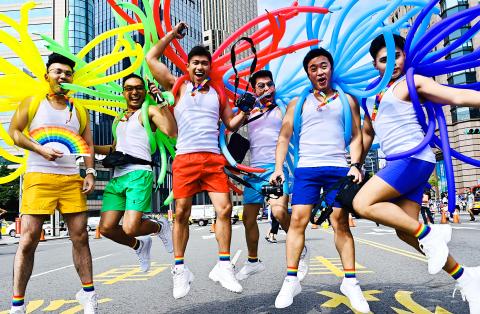As a Singapore court prepares to hear a series of legal challenges to a law that bans gay sex, LGBT+ activists on Tuesday called for the “right” verdict to be delivered so similar reforms can be triggered across other parts of Asia.
Like many other former British colonies, Singapore has retained an old law that criminalizes gay sex, which was scrapped by India in a landmark court ruling last year to give a boost to LGBT+ rights.
Empowered by the Indian ruling, three Singaporean activists have launched separate bids in a renewed push to decriminalize gay sex in the city-state, where a high court is due to begin hearing their cases on Wednesday.

Photo: AFP
“I think public opinion is pretty clear across religious and age segments that homosexuality should not be a criminal offence,” said Johnson Ong Ming, who was among the trio.
Ong, a DJ also known as DJ Big Kid, was the first to launch the case in September last year. The former head of a LGBT+ rights charity and a retired doctor also filed similar lawsuits later.
“I have full confidence in our judicial system and I am hopeful that the court will come to the right decision ... and overturn Section 377A,” Ong said by e-mail.
The court has set aside six days in November for the legal challenges to be heard but it is unclear when the proceedings will wrap up.
Under Section 377A of Singapore’s Penal Code, a man found to have committed an act of “gross indecency” with another man could be jailed for up to two years, although prosecutions are rare. The law does not apply to homosexual acts between women.
Singapore has emerged as a modern nation since independence six decades ago but socially it remains conservative, partly due to sensitivities stemming from multi-religious groups among its 5.6 million population.
Previous legal challenges to overturn the ban have failed, although recent opinion polls indicated there has been growing support for gay rights.
Opposition to gay marriage had fallen to 60 percent, down from 74 percent in 2013, according to a poll of more than 4,000 people published in May by the Institute of Policy Studies, a Singapore think-tank.
Prime Minister Lee Hsien Loong however has previously said that Singapore society “is not that liberal on these matters”.
The Singapore court cases are being closely watched by LGBT+ groups in some other parts of Asia that have maintained the colonial-era law, including in Myanmar and Malaysia.
“If the decision in Singapore goes our way, then it will boost our morale here in Malaysia,” said Numan Afifi, president of the LGBT+ advocacy Pelangi Campaign in Malaysia.
Aung Myo Min, executive director from the Yangon-based Equality Myanmar LGBT+ campaign group said both Singapore and Myanmar “should follow the example of India” and repeal the archaic law.
Gay sex is a crime in both countries, with those convicted facing sentences of up to 10 years in jail in Myanmar and 20 years in Malaysia.

June 23 to June 29 After capturing the walled city of Hsinchu on June 22, 1895, the Japanese hoped to quickly push south and seize control of Taiwan’s entire west coast — but their advance was stalled for more than a month. Not only did local Hakka fighters continue to cause them headaches, resistance forces even attempted to retake the city three times. “We had planned to occupy Anping (Tainan) and Takao (Kaohsiung) as soon as possible, but ever since we took Hsinchu, nearby bandits proclaiming to be ‘righteous people’ (義民) have been destroying train tracks and electrical cables, and gathering in villages

Dr. Y. Tony Yang, Associate Dean of Health Policy and Population Science at George Washington University, argued last week in a piece for the Taipei Times about former president Ma Ying-jeou (馬英九) leading a student delegation to the People’s Republic of China (PRC) that, “The real question is not whether Ma’s visit helps or hurts Taiwan — it is why Taiwan lacks a sophisticated, multi-track approach to one of the most complex geopolitical relationships in the world” (“Ma’s Visit, DPP’s Blind Spot,” June 18, page 8). Yang contends that the Democratic Progressive Party (DPP) has a blind spot: “By treating any

This year will go down in the history books. Taiwan faces enormous turmoil and uncertainty in the coming months. Which political parties are in a good position to handle big changes? All of the main parties are beset with challenges. Taking stock, this column examined the Taiwan People’s Party (TPP) (“Huang Kuo-chang’s choking the life out of the TPP,” May 28, page 12), the Democratic Progressive Party (DPP) (“Challenges amid choppy waters for the DPP,” June 14, page 12) and the Chinese Nationalist Party (KMT) (“KMT struggles to seize opportunities as ‘interesting times’ loom,” June 20, page 11). Times like these can

Swooping low over the banks of a Nile River tributary, an aid flight run by retired American military officers released a stream of food-stuffed sacks over a town emptied by fighting in South Sudan, a country wracked by conflict. Last week’s air drop was the latest in a controversial development — private contracting firms led by former US intelligence officers and military veterans delivering aid to some of the world’s deadliest conflict zones, in operations organized with governments that are combatants in the conflicts. The moves are roiling the global aid community, which warns of a more militarized, politicized and profit-seeking trend